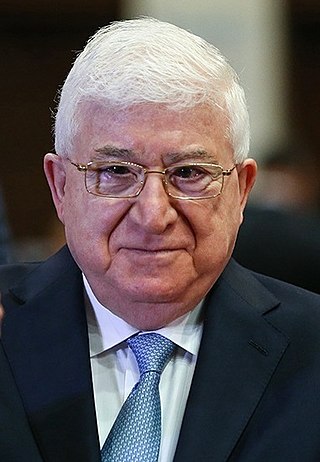Fuad Masum
President of Iraq from 2014 to 2018 From Wikipedia, the free encyclopedia
Muhammad Fuad Masum Hurami (Arabic: محمد فؤاد معصوم, romanized: Muḥammad Fū’ād Ma‘ṣūm; Kurdish: محەممەد فوئاد مەعسووم هەورامی, born 1 January 1938) is an Iraqi Kurdish politician who served as the seventh president of Iraq from 24 July 2014 to 2 October 2018. He was elected as president following the 2014 parliamentary election.[1] Masum is the second non-Arab president of Iraq, succeeding Jalal Talabani, also Kurdish, and was a confidant of Talabani.
Fuad Masum | |
|---|---|
فوئاد مەعسووم فؤاد معصوم | |
 Masum in 2018 | |
| 7th President of Iraq | |
| In office 24 July 2014 – 2 October 2018 | |
| Prime Minister | Nouri al-Maliki Haider al-Abadi |
| Vice President | Khodair al-Khozaei Nouri al-Maliki Osama al-Nujaifi Ayad Alawi |
| Preceded by | Jalal Talabani |
| Succeeded by | Barham Salih |
| Speaker of the Council of Representatives Acting | |
| In office 14 June 2010 – 11 November 2010 | |
| President | Jalal Talabani |
| Preceded by | Ayad al-Samarrai |
| Succeeded by | Osama al-Nujaifi |
| 1st Prime Minister of Kurdistan Region | |
| In office 4 July 1992 – 26 April 1994 | |
| President | Saddam Hussein |
| Preceded by | Position established |
| Succeeded by | Kosrat Rasul Ali |
| Personal details | |
| Born | 1 January 1938 Koya, Kingdom of Iraq |
| Political party | Patriotic Union of Kurdistan (1974–present) |
| Other political affiliations | Iraqi Communist Party (1962–1964) Kurdistan Democratic Party (1964–1974) |
| Spouse |
Rounak Abdulwahid Mustafa
(m. 1968; died 2023) |
| Children | 6; including Juwan |
| Alma mater | University of Baghdad Al-Azhar University |
| Religion | Sunni Islam |
| Signature | |
Early life and education
Fuad Masum was born in the city of Koya. He is the son of Mullah Masum Khider, a former head of the Association of Muslim Scholars in Kurdistan, who belongs to an established political dynasty with Muslim clerical links.[2][3] His family descends from the village of Khabanen, which is part of Hawraman.[4] He studied at various religious schools in Iraqi Kurdistan until the age of 18. He studied law and Sharia at Baghdad University.[5] In 1958, Masum traveled to Cairo to complete his higher education at Al-Azhar University.[6] He worked as a professor in Basrah University in 1968.[5] He earned his PhD in Islamic philosophy from Al-Azhar in 1975.[5]
Political career
Summarize
Perspective

Communist Party
Masum joined the Iraqi Communist Party in 1962, until 1964, where he travelled to Syria to meet the Communist Party secretary there, Khalid Bakdash.[4] After Masum discovered Bakdash's attitudes against the Kurds, he quit the party to join the Kurdistan Democratic Party (PDK).[7][8]
Kurdistan Democratic Party
In 1968, Masum was the PDK representative in Basra. He was also the representative of the Kurdish Revolution in Cairo until 1975.[4]
Patriotic Union of Kurdistan
Masum was one of the founders of the Patriotic Union of Kurdistan (PUK) in 1976.[7] By 1992, he was the first Prime Minister of Kurdistan Region.[7] In 2003, following the invasion of Iraq, Masum returned to Baghdad to be a member of the delegation representing Kurdistan, and was a member of the constitution drafting committee.[4] In 2010, Masum became the first Speaker of the Council of Representatives.[5]
Presidency

In 2014, he was elected by the parliament representatives as the seventh president of Iraq.[9] Masum won 211 votes while his closest competitor, Barham Salih,[9] only received 17.[10] The decision was made during a secret vote of Kurdish MPs, who traditionally have control over the presidency for the sake of political balance.[9] United Nations Secretary-General Ban Ki-moon was present in Iraq when the decision was made, meeting with Prime Minister Nouri al-Maliki about the need for a more inclusive government.[11] Masum accepted the position, noting the "huge security, political and economic tasks" he faces as president.[12]
On 26 August, Masum appointed a new prime minister, Haider al-Abadi.[13] His appointment was considered illegal by Nouri al-Maliki and in violation of the constitution.[14] Maliki said that in spite of his erosion of power it was his duty to remain in power because the appointment was a conspiracy rooted from outside of Iraq.[15] Al-Maliki referred the matter to the federal court claiming, "the insistence on this until the end is to protect the state."[16] However, on 14 August 2014, in the face of growing calls from world leaders and members of his own party, Maliki announced he was stepping down, paving the way for al-Abadi to take over.[17]
Personal life
Masum married to Rounak Abdulwahid Mustafa (1941–2023)[18] in 1968, and has five daughters: Shireen (b. 1969), Juwan (b. 1972), Zozan (b. 1977), Shilan (b. 1979) and Veyan (b. 1984). He had a son, Showan (1974–1988), who died from a childhood illness.[19]
References
External links
Wikiwand - on
Seamless Wikipedia browsing. On steroids.
